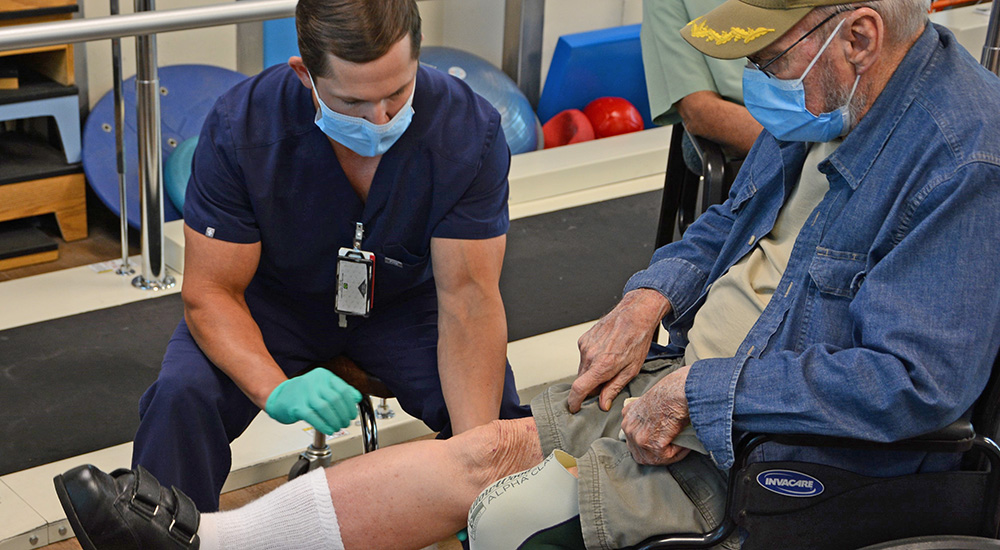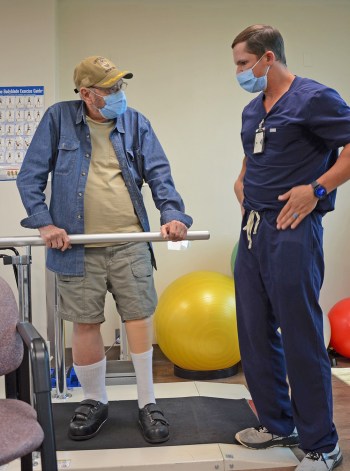Overton Brooks VA treats more than 300 patients with major limb loss. Kinesiotherapist Russell Barmer’s passion is to lessen his patients’ impact and restore a form of normality for them. He does this with VA’s Outpatient Amputation Specialty Clinics and its national directive to increase clinic accessibility to patients with limb loss.
The outpatient clinic setting is an essential environment for the provision of amputation care and rehabilitation services. Through these services, either in-person or telehealth, VA strives to minimize disability and enable the highest level of functional, social, vocational and recreational success for Veterans with amputation.
“Many of our Veterans have amputations done in the private sector at other hospitals, and we are working on getting our information out to those other facilities to ensure they are aware of our amputation system of care here at VA,” said Barmer, pictured at right. “We haven’t seen some of our patients for a while. They have moved away or don’t believe they need to come in for checkups… We have follow up visits at least once a year even if the patient does not feel they have any issues with their prosthetic limbs.”
“Giving our Veterans the service they deserve.”
A recent patient, Navy Veteran Garland Fryday, had not been to the Kinesiotherapy Clinic for eight years. His visit to the clinic was to see if he could get a new cosmetic cover for his prosthetic leg.
“He was seeing the contractor that made his prosthetic and didn’t think he needed to come here, said Barmer. “We’re trying to see our patients and give them the service they deserve. The equipment wears out and we don’t want Veterans out there using bad equipment.”
Barmer, along with his colleague Angela Courtade, Southeastern Clinic regional director orthotist-prosthetist, assisting via video teleconference, addressed sores and irritations that had developed on Fryday’s residual limb along with problems developing on his sound limb.
“It’s very important to preserve the sound limb as foot problems can become a major concern for Veterans. Early treatment with proper shoe wear, socks, compression garments and orthotic interventions can reduce the risk of serious infection or additional amputations,” said Courtade.
“I always get more than I expect.”
“I receive great care here. I always get more then I expect and everyone is so nice,” said Fryday.
Overton Brooks VA is designated as an APoC site, an amputation point of contact location. The medical center serves as a location for consultation, assessment and referral of the Veterans to a facility capable of providing the level of services required.
“I see the emotional side to prosthetics. It all depends on how the limb was lost,” said Barmer. “If a patient has an unrecoverable sick limb that requires amputation and receives a prosthesis, they are generally happy that they have it and their transition is easier. However, when a patient loses a limb suddenly, as in war, and they are fit with a prosthesis, it can be quite an emotional event. That is why the VA APoC also recommends referrals to our mental health services to help Veterans deal with a limb loss.”
“Providers that care deeply for their patients.”
VA has programs and counseling set up to help with this transition and they are offered before and after amputation and before the prosthetic.
The Kinesiotherapy Clinic is working toward their Council on Professional Standards for Kinesiotherapy certification as a Center of Excellence for clinical internship for students in the field of Kinesiotherapy.
“We want the medical center to be the best place possible for patients and a continual learning environment for staff, residents and students,” said Courtade. “Since this clinic has great providers that care deeply for their patients, we need to do what we can to show prospective kinesiotherapist students that this is the place to come and learn.”
Topics in this story
More Stories
Study underscores important role COVID vaccination can have in protecting Veterans from infection and reducing long-term health consequences
Columbia VA’s robotic surgery teams completed their 800th robotic surgery and are on schedule to hit 1,000 by the end of the year.
In a decentralized clinical trial, Veterans can participate from their own homes or local VA instead of having to travel to a research site.








Good idea from 53 year service connected amputee